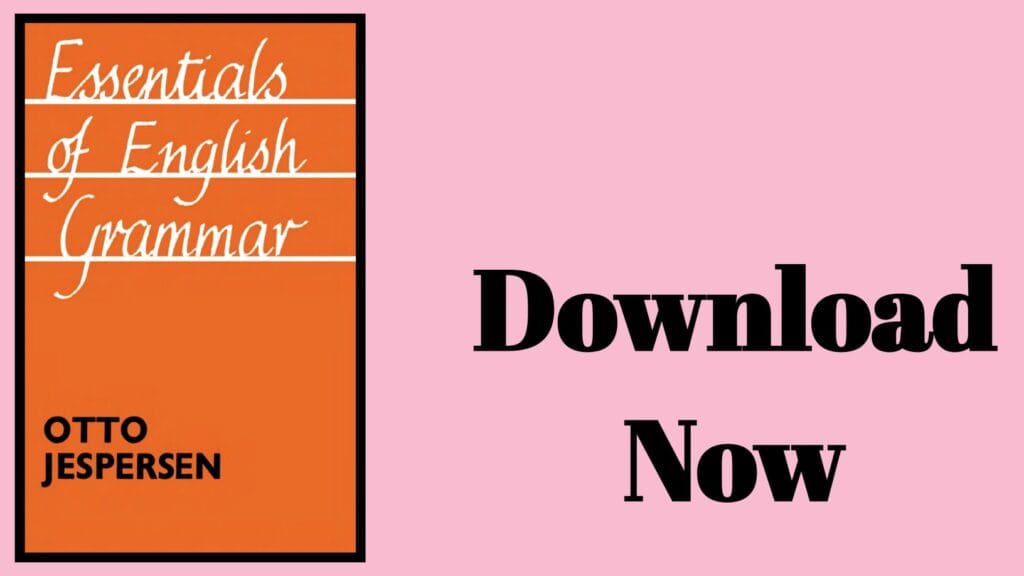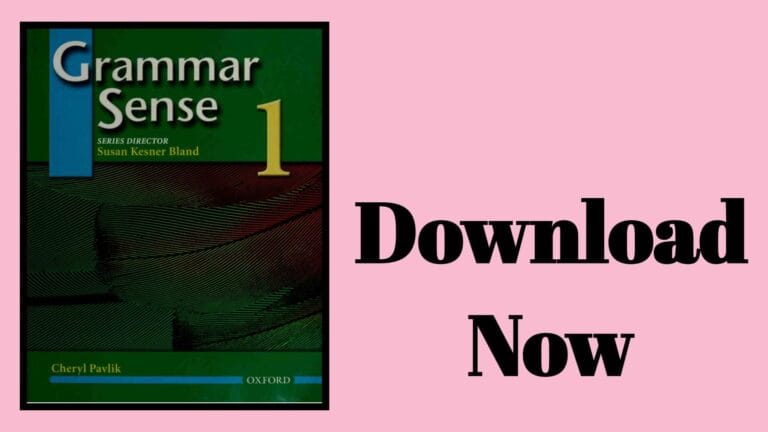
The Book Description
The book “Essentials of English Grammar” is an English grammar book that is different from other books on the same topic and unique in terms of its approach. The best part of the book is a complete package for the learners of the English grammar; that is, it touches on all the three aspects of the language: pronunciation, grammar and vocabulary.
The pdf book teaches you in deep details the sound system, rules and lexicon of the English language all of which are essential to focus on for the learners. Weakness in any of the three aspects makes you feel unconfident while you speak English in public. So, your pronunciation, grammar and vocabulary skills will improve if you do a thorough reading of the book.
Who Should Read This Book?
The name of the book, “Essentials of English Grammar” suggests that the book touches on the essential selective grammar topics which are really crucial from learners’ perspective. Therefore, the ideal readers of the book are those students of English who already have got some knowledge about its grammars, pronunciation rules and vocabulary formation.
In that case, it’s suggested to the intermediate and advanced learners of the English language who can get most out of the book as they will easily grab the ideas of the author without any difficulties. Remember that the book includes some of the most advanced language aspects like phonetics, sentence structures, the evolution of the sound system, word formation, dialects, etc.
Interesting Features of the Book
Through his amazing style of teaching, the author crafted the lessons beautifully and amazingly. The contents of the book, when you read them, are really really interesting. The book does not only teach you the grammars but also the sound system of the English language which makes it a full package for the learners.
The book contains a number of chapters that feature different aspects of the language starting from the sound system and ending in the clauses and grammatical orders of words. It also touches on the topics such as word classes, spellings, sentence structures, subject verb agreement, grammatical case, number and gender.
The Table of Contents
CHAPTER I: INTRODUCTORY
What is grammar? Local and social dialects. Spoken and written language. Formulas and free expressions. Expression, suppression, and impression. Prescriptive, descriptive, explanatory, historical, appreciative grammar. Purpose and plan of this grammar.
CHAPTER II: SOUNDS
Phonetic script. Lips. Tip of the tongue. Blade. Front and back of the tongue. Vowels. Soft palate. Vocal chords. Table of consonants. Syllables. Diphthongs. Length. Stress and tone.
CHAPTER III: EVOLUTION OF THE SOUND-SYSTEM
Sound laws. Alternations. Stress. The great vowel shift.
CHAPTER IV: EVOLUTION OF THE SOUND-SYSTEM (CONTINUED)
Weakening of r. Short vowels before r. ar, or, etc. Alternations with and without r. Influence of stress on vowels. Loss of e. Vowels in weak syllables. Loss of vowels in groups. Alternations in compounds. Strong and weak forms of the same word.
CHAPTER V: EVOLUTION OF THE SOUND-SYSTEM (CONTINUED)
Consonants. Tolerated consonant groups. Consonants dropped. Voiced and voiceless consonants. H. Assibilation. Stump-words.
CHAPTER VI: SPELLING
Causes of unphonetic spelling. French influence: ch, g, c, ou, u, o. Doubling of letters. Differentiation of i, j, u, v. Learned spellings.
CHAPTER VII: WORD-CLASSES
Substantives. Adjectives. Verbs. Pronouns. Numerals. Particles. Provisional survey of inflections. Derivation of word-classes.
CHAPTER VIII: THE THREE RANKS
Three ranks. Primaries: Adjectives. Adverbs. Pronouns. The prop-word one. Secondaries: Substantives. Pronouns. Adverbs. Tertiaries: Substantives. Adjectives. Pronouns. Rank of word-groups.
CHAPTER IX: JUNCTION AND NEXUS
Adjunct and adnex. Restrictive and non-restrictive adjuncts. Relation between adjunct and primary. Adjuncts of composite names. Apposition. Participles. Extraposition. Nexus. Dependent nexus.
CHAPTER X: SENTENCE-STRUCTURE
Subject and predicate. Object. Word-order. Inversion. Amorphous sentences.
CHAPTER XI: RELATIONS OF VERB TO SUBJECT AND OBJECT
Agent and sufferer. Double-faced verbs. Split subjects. Object. Instrumental. Result. Cognate. Same verb, different objects. Prepositional phrases. Reflexive. Reciprocal. Indirect object. The to-phrase. Transitive and intransitive. Objects after adjectives.
CHAPTER XII: PASSIVE
Formation of the passive. Why is this turn chosen? The subject of a passive verb. Converted subject.
CHAPTER XIII: PREDICATIVES
Extraposition. Quasi-predicatives. Real predicatives. Link-verb. No verb. Predicatives of becoming. What can be a predicative? Article or no article with substantives as predicatives. Predicative left out.
CHAPTER XIV: CASE
Cases in pronouns. Nominative and objective. After than and as. But, save, except. Case after let. Relative attraction. Predicative. Objective in independent position. Himself. Who. Second person. Cases in substantives. Common case and genitive. Group-genitive. Difficulties with pronouns. The meaning of genitive. Restrictions in the use of the genitive. Lifeless things. Measures. Genitives as primaries. Genitive after of.
CHAPTER XV: PERSON
Three persons. Substitutes for pronouns. Indirect speech. Vocative. Imperative. Verbs. Difficulties. Generic person.
CHAPTER XVI: DEFINITE PRONOUNS
Division of pronouns. Pronouns of contextual indication (Personal pronouns). Ambiguities. Unspecified they. The self-pronouns. It. Preparatory it. Unspecified it. Emphatic it. Pronouns of pointing: this, that, yon. Representative that. Indefinite that. Thus. So. The definite article. Demonstrative the. The article of complete determination. Words without article. Proper names. Times and dates. The typical. Distributive. Languages. Diseases. No article. Repetition. The article of incomplete determination. Adjectives with proper names. The pronoun of identity (same). The pronoun of similarity (such).
CHAPTER XVII: INDEFINITE PRONOUNS
Indefinite unity (one). Indefinite article. Place of indefinite article. Pronoun of difference (other). Pronoun of discretion (certain). Pronoun of unspecified quantity (some). Pronouns of indifference (any, either).
CHAPTER XVIII: PRONOUNS OF TOTALITY
Positive (all, both, every, each). Negative (no, none, neither).
CHAPTER XIX: GENDER
Sex and gender. Substantives:
(A) Three words.
(B) Two words. Man. Derived words.
(C) One word. Indication of sex. Pronouns. It used of living beings. He or she of lifeless things. Countries. Abstracts. Who and which.
CHAPTER XX: NUMBER
Numerals. Ordinals. Singular and plural. Substantives. Irregularities. Learned plurals. The unchanged plural. Compounds. Pronouns. The meaning of plural. Special meaning in plural. Words used in plural only.
CHAPTER XXI: NUMBER (CONTINUED)
Thing-words (countables) and mass-words (uncountables). Same word used in both ways. Plural mass-words. Vacillation. Individualization. Collectives. Special complications. Higher units. The generic number. Number in secondary words. First part of compounds. Verbs.
CHAPTER XXII: DEGREE
Positive, comparative, and superlative. Regular forms. Irregularities. More and most. Meaning. Superiority, equality, and inferiority. Seeming comparatives. Gradual increase. Parallel increase. Weakened comparatives. Higher degree than the positive. Too. Prefer. Superlative. Superlative in speaking of two. Limited superlative. Most. Latin comparatives.
CHAPTER XXIII: TENSE
Time and tense. Past, present, and future time with subdivisions. Tenses of English verbs. Present tense. Formation of preterit. Tense-phrases. Perfect and pluperfect. Expanded tenses. Use of the present tense. Present time. Past time. Future time. Auxiliaries of the perfect and pluperfect. Old and modern use of be. Inclusive time. I have got. Use of the preterit and perfect. Used to. Preterit for before-past time. The pluperfect. Infinitive. Imperative. Participles. Second participle. Perfect participle. Gerund.
CHAPTER XXIV: TENSE (CONTINUED)
Tenses in the passive. Conclusive verbs. Present tense. Preterit. Perfect, etc. Other auxiliaries in the passive. Imaginative use of the tenses. The preterit of imagination. Wishes. Conditions. Was and were. Could, might, ought, should. Time he went. Pluperfect of imagination. Infinitive of imagination. Indirect speech. Expanded tenses. Special cases. Passive. Conclusion.
CHAPTER XXV: WILL AND SHALL
Full verb will. Auxiliary will. Volition. Habit. Volition-colored future. First person. Second person. Condition. Pure future. I will. Before-future. Supposition. Shall. Obligation. Command. Promise or threat. Questions. Pure future. First person. Before-future. Questions. Summary.
CHAPTER XXVI: WOULD AND SHOULD
Would. Real past. Habit. Imaginative. I would. Would you. Wishes. Conditioned sentences. First person. Should. Real past. Imaginative. Obligation. Advice. Obligation effaced. Conditional clauses. Emotional should. Will, shall, would, should in indirect speech. Notional survey of time-expressions.
CHAPTER XXVII: MOOD
Forms. Indicative. Subjunctive. Main sentences. Clauses. Imperative. Let.
CHAPTER XXVIII: AFFIRMATION, NEGATION, QUESTION
Affirmation. Emphatic. Negation. Two tendencies. Reconciliation. Do. Negation to special word. With infinitive. May not, must not. Attraction. The meaning of negation. Quantitative terms. Not and no with comparatives. Not all, etc. Double negation. Weakened and implied negation. Questions. Two kinds. Nexus-questions. X-questions. Pronouns. Prepositions last. Adverbs. Intonation. Word-order. Do. Double-barreled questions. Elliptical questions. Exclamations. Dependent questions.
CHAPTER XXIX: DEPENDENT NEXUS
Different forms of dependent nexus. Simple nexus as object. Object of result. Have. After other verbs. Passive. Nexus object of preposition. Simple nexus as tertiary. Reason or condition. Time. Description. Condensed expressions. Word-order.
CHAPTER XXX: NEXUS-SUBSTANTIVES
Formed from predicatives or from verbs. Subject or object. Genitive or of. Active or passive import. Both subject and object. Concrete meaning of nexus-substantive.
CHAPTER XXXI: THE GERUND
Hybrid between substantive and verb. Treated as substantive. Similarities with verbs. Active and passive meaning. Object. Subject. Genitive or possessive. Difficulties. Common case. Personal pronouns. Gerund or participle? Of and by. The gerundial nexus itself subject. It and there.
CHAPTER XXXII: THE INFINITIVE
Substantive or verb? Bare infinitive and to-infinitive. Infinitives as primaries. Object without to. With to. Have to. Verbs, substantives, and adjectives with to. Infinitive after preposition. After than. Infinitives as secondaries. To do. Passive meaning. Is to. Infinitives as tertiaries. Purpose. Result. Primaries of an infinitive-nexus. Subject not mentioned. Infinitival nexus as object. As object of result. After a preposition. For, with this construction. Subject and infinitive itself subject. Split subject. Passive. For-construction. There. Final remarks. Place of adverbs. To as representative of infinitive. Infinitive and gerund. Infinitive itself a sentence.
CHAPTER XXXIII: CLAUSES AS PRIMARIES
Content-clauses. Use of it. Content-clause after preposition. Clauses without that. Interrogative clauses as primaries. Clauses without conjunction. Clause after preposition. Infinitive clauses. No preposition before clause. Relative clauses as primaries. Correct analysis. Use of who in such clauses. Pronouns with ever. Extraposition. Mental parenthesis. Relative or interrogative.
CHAPTER XXXIV: CLAUSES AS SECONDARIES
Relative clauses. Restrictive and non-restrictive. Double restriction. It is. Form of relative clauses. Clauses with *wh-*pronouns. Which as adjunct. Two coordinated clauses. Contact clauses. Clauses with that. *Wh-*pronouns preferred in speaking of persons. That however used. Other cases. That a conjunction. As. But. Final remarks. Place of preposition. Irregular continuation. Concatenation of clauses. Adverbs whereof, etc.
CHAPTER XXXV: CLAUSES AS TERTIARIES
Place. Time. Contrast. Manner. Comparison. Cause. Purpose. Result. Condition. Restriction. Concession. Indifference. Parallelism. Amorphous clauses.
CHAPTER XXXVI: RETROSPECT
Synopsis of grammatical means. The unchanged word. Stress and tone. Other modifications. Endings. Separate roots. Grammatical words. Word-order. Grammatical synonyms.
INDEX
A comprehensive index concludes the volume, providing detailed reference points for the topics covered throughout the chapters.


